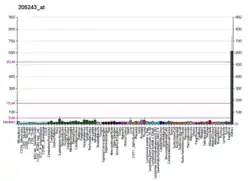SLC13A3
Solute carrier family 13 member 3 also called sodium-dependent dicarboxylate transporter (NaDC3) is a protein that in humans is encoded by the SLC13A3 gene.[5][6][7]
Mammalian sodium-dicarboxylate cotransporters transport succinate and other Krebs cycle intermediates. They fall into 2 categories based on their substrate affinity: low affinity and high affinity. Both the low- and high-affinity transporters play an important role in the handling of citrate by the kidneys. The protein encoded by this gene represents the high-affinity form. Alternatively spliced transcript variants encoding different isoforms have been found for this gene, although the full-length nature of some of them have not been characterized yet.[7]
See also
References
- GRCh38: Ensembl release 89: ENSG00000158296 - Ensembl, May 2017
- GRCm38: Ensembl release 89: ENSMUSG00000018459 - Ensembl, May 2017
- "Human PubMed Reference:". National Center for Biotechnology Information, U.S. National Library of Medicine.
- "Mouse PubMed Reference:". National Center for Biotechnology Information, U.S. National Library of Medicine.
- Wang H, Fei YJ, Kekuda R, Yang-Feng TL, Devoe LD, Leibach FH, Prasad PD, Ganapathy V (Jun 2000). "Structure, function, and genomic organization of human Na(+)-dependent high-affinity dicarboxylate transporter". Am J Physiol Cell Physiol. 278 (5): C1019–30. doi:10.1152/ajpcell.2000.278.5.C1019. PMID 10794676.
- Huang W, Wang H, Kekuda R, Fei YJ, Friedrich A, Wang J, Conway SJ, Cameron RS, Leibach FH, Ganapathy V (Nov 2000). "Transport of N-acetylaspartate by the Na(+)-dependent high-affinity dicarboxylate transporter NaDC3 and its relevance to the expression of the transporter in the brain". J Pharmacol Exp Ther. 295 (1): 392–403. PMID 10992006.
- "Entrez Gene: SLC13A3 solute carrier family 13 (sodium-dependent dicarboxylate transporter), member 3".
Further reading
- Markovich D, Murer H (2004). "The SLC13 gene family of sodium sulphate/carboxylate cotransporters". Pflügers Arch. 447 (5): 594–602. doi:10.1007/s00424-003-1128-6. PMID 12915942. S2CID 7609066.
- Deloukas P, Matthews LH, Ashurst J, et al. (2002). "The DNA sequence and comparative analysis of human chromosome 20". Nature. 414 (6866): 865–71. doi:10.1038/414865a. PMID 11780052.
- Strausberg RL, Feingold EA, Grouse LH, et al. (2003). "Generation and initial analysis of more than 15,000 full-length human and mouse cDNA sequences". Proc. Natl. Acad. Sci. U.S.A. 99 (26): 16899–903. doi:10.1073/pnas.242603899. PMC 139241. PMID 12477932.
- Ota T, Suzuki Y, Nishikawa T, et al. (2004). "Complete sequencing and characterization of 21,243 full-length human cDNAs". Nat. Genet. 36 (1): 40–5. doi:10.1038/ng1285. PMID 14702039.
- Gerhard DS, Wagner L, Feingold EA, et al. (2004). "The status, quality, and expansion of the NIH full-length cDNA project: the Mammalian Gene Collection (MGC)". Genome Res. 14 (10B): 2121–7. doi:10.1101/gr.2596504. PMC 528928. PMID 15489334.
- Burckhardt BC, Lorenz J, Kobbe C, Burckhardt G (2005). "Substrate specificity of the human renal sodium dicarboxylate cotransporter, hNaDC-3, under voltage-clamp conditions". Am. J. Physiol. Renal Physiol. 288 (4): F792–9. doi:10.1152/ajprenal.00360.2004. PMID 15561973.
- Bai X, Chen X, Feng Z, et al. (2006). "Identification of basolateral membrane targeting signal of human sodium-dependent dicarboxylate transporter 3". J. Cell. Physiol. 206 (3): 821–30. doi:10.1002/jcp.20553. PMID 16331647. S2CID 37471691.
This article incorporates text from the United States National Library of Medicine, which is in the public domain.





